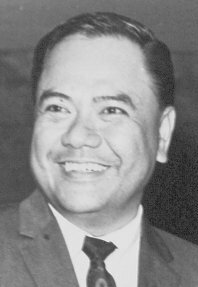
Back بلاس اوپل ARZ بلاس اوپله AZB Blas Ople German Blas Ople Spanish Blas Ople Italian Blas Ople Dutch Blas Ople Tagalog
Blas Ople | |
|---|---|
 | |
| 17th President of the Senate of the Philippines | |
| In office June 29, 1999 – July 12, 2000[1] | |
| President | Joseph Estrada |
| Preceded by | Marcelo Fernan |
| Succeeded by | Franklin Drilon |
| 17th and 19th President pro tempore of the Senate of the Philippines | |
| In office October 10, 1996 – June 29, 1999 | |
| Preceded by | Leticia Ramos Shahani |
| Succeeded by | John Henry Osmeña |
| In office July 12, 2000 – June 30, 2001 | |
| Preceded by | John Henry Osmeña |
| Succeeded by | Manuel Villar |
| 22nd Secretary of Foreign Affairs | |
| In office July 16, 2002 – December 14, 2003 | |
| President | Gloria Macapagal Arroyo |
| Preceded by | Gloria Macapagal Arroyo (acting) |
| Succeeded by | Franklin Ebdalin (acting) |
| Senator of the Philippines | |
| In office June 30, 1992 – July 16, 2002 | |
| Minister of Labor | |
| In office 1972 – February 25, 1986 | |
| President | Ferdinand Marcos |
| Preceded by | Adrian E. Cristobal |
| Succeeded by | Augusto Sanchez |
| Secretary of Labor | |
| In office September 16, 1967 – 1971 | |
| President | Ferdinand Marcos |
| Preceded by | Emilio Espinosa, Jr. |
| Succeeded by | Adrian E. Cristobal |
| Mambabatas Pambansa (Assemblyman) from Bulacan | |
| In office June 30, 1984 – March 25, 1986 Served with: Jesus S. Hipolito Rogaciano M. Mercado Teodulo C. Natividad | |
| Mambabatas Pambansa (Assemblyman) from Central Luzon | |
| In office June 12, 1978 – June 5, 1984 | |
| Member of the Philippine Constitutional Commission | |
| In office June 2, 1986 – October 15, 1986 | |
| President | Corazon Aquino |
| Personal details | |
| Born | Blas Fajardo Ople February 3, 1927 Hagonoy, Bulacan, Philippine Islands |
| Died | December 14, 2003 (aged 76) Taoyuan, Taiwan |
| Resting place | Libingan ng mga Bayani 14°31′16″N 121°2′34″E / 14.52111°N 121.04278°E |
| Political party | Laban ng Demokratikong Pilipino (1992–2003) |
| Other political affiliations | Kilusang Bagong Lipunan (1978–1992) Nacionalista (until 1972) |
| Spouse | Susana Ople |
| Children | 7, including Susan |
| Alma mater | Manuel L. Quezon University (BA) |
| Occupation | Journalist; Politician |
Blas Fajardo Ople (February 3, 1927 – December 14, 2003) was a Filipino journalist and politician who held several high-ranking positions in the executive and legislative branches of the Philippine government, including as Senate President from 1999 to 2000, and as Secretary of Foreign Affairs from 2002 until his death. Perceived as a leftist-nationalist at the onset of his career in public service, Ople was, in his final years, a vocal supporter for allowing a limited United States military presence in the Philippines, and for American initiatives in the War on Terror including the 2003 U.S. invasion of Iraq.
Ople's most enduring role was his nineteen years as Secretary (later Minister) of Labor and Employment during the administration of President Ferdinand Marcos, when Philippine labor laws were overhauled through the enactment of the Labor Code of the Philippines that he had helped author.
- ^ "Biography of Senate President Ople – Senate of the Philippines" Archived March 17, 2008, at the Wayback Machine. senate.gov.ph.
© MMXXIII Rich X Search. We shall prevail. All rights reserved. Rich X Search